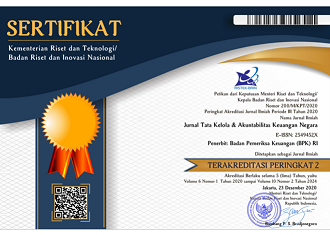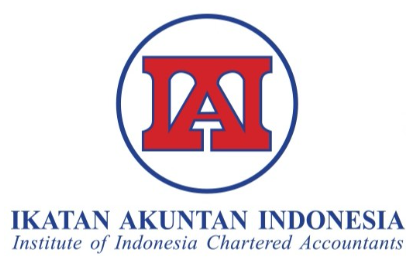The effect of audit cost, information technology, and auditor's competence on audit quality during the COVID-19 Pandemic
DOI:
https://doi.org/10.28986/jtaken.v7i1.527Keywords:
COVID-19, external auditors, audit, government, accountability, financial statementsAbstract
The Corona Virus Disease (COVID-19) is endemic in Indonesia and affects many sectors, including the economic and government sectors. During the COVID-19 pandemic, BPK, as the government’s external auditors, continued to carry out the audit to maintain accountability for state finances despite budget refocusing and large-scale social restrictions (Pembatasan Sosial Berskala Besar, PSBB). This study aims to determine the significance of audit costs due to budget refocusing, IT utilization, and auditor competence on audit quality during the work from home (WFH) policy. This study processed questionnaire data from 70 auditors from three representative offices of BPK in provinces under three different categories, namely A, B, and C. The research data was processed using SmartPLS software to analyze data with measurement models and structural models with a 90 percent confidence level. Data processing shows that the effect of audit costs and the use of information technology on audit quality during the COVID-19 pandemic has a feeble and insignificant effect; thus, the hypothesis is not supported. Meanwhile, the competence of auditors has a significant effect on the quality of audit results; ergo, the hypothesis is supported.
References
Adams, M. B. (1994). Agency theory and the internal audit. Managerial Auditing Journal, 9(8), 8–12. DOI: 10.1108/0268690941007 1133
Agoes, S., & Hoesada, J. (2012). Bunga rampai auditing (Edisi Kedua). Jakarta: Salemba Empat.
Albitar, K., Gerged, A. M., Kikhia, H., & Hussainey, K. (2020). Auditing in times of social distancing: The effect of COVID-19 on auditing quality. International Journal of Accounting & Information Management, 29(1), 169 -178. DOI: 10.1108/IJAIM-08-20200128
Amiruddin., Pagalung, G., Kartini., & Arifuddin. (2016). The effects of time pressure, work-family conflict and role ambiguity on work stress and its effect on audit quality reduction behavior. International Journal of Law and Management, Emerald Publishing Limited, 10(12), 1–23. DOI: 10.1108/ IJLMA-09-2017-0223
Ardi, N., & Isnayanti. (November, 2019). Structural Equation Modelling-Partial Least Square to determine the correlation of factors affecting poverty in Indonesian provinces. International Conference on Applied Sciences, Information and Technology. Padang, Indonesia. DOI: 10.1088/1757899X/846/1/012054
Arisinta, O. (2013). Pengaruh kompetensi, independensi, time budget pressure, dan audit fee terhadap kualitas audit pada kantor akuntan publik di Surabaya. Jurnal Ekonomi Dan Bisnis Airlangga, 23(3), 266–278.
BPK RI. (2014). Decree of the Secretary General of BPK RI Number 139/K/XXIII.2/4/2014 concerning the Guidelines for the Implementation of Audit Performance Assessment (Keputusan Sekretaris Jenderal BPK RI Nomor 139 Tahun 2014 tentang Petunjuk Pelaksanaan Penilaian Kinerja Pelaksanaan Pemeriksaan pada BPK RI).
BPK RI. (2017). BPK Regulation Number 1 Year 2017 concerning State Financial Audit Standards (Peraturan Badan Pemeriksa Keuangan Republik Indonesia Nomor 1 Tahun 2017 tentang Standar Pemeriksaan Keuangan Nega
ra). Retrieved from http://www. spkn. bpk. go. id.
Cheng, Y. S., Liu, Y. P., & Chien, C. Y. (2009). The association between auditor quality and human capital. Managerial Auditing Journal, Emerald Insight, 24(6), 523– 541. DOI: 10.1108/026869009 10966512
Dewi, R. N., Maulana, I., & Muhadzib, M. (2017). The influence of auditor independence, work experience, job satisfaction, and auditor competency against audit quality. Indonesian Management and Accounting Research, 16(2), 47–65. DOI: 10.25105/imar.v16i2.4687
El-Gammal, W. (2012). Determinants of audit fees: Evidence from Lebanon. International Business Research, 5(11), 136–145. DOI: 10.5539/ibr.v5n11p136
Ettredge, M., Fuerherm, E. E., & Li, C. (2014). Fee pressure and audit quality. Accounting, Organizations and Society, Elsevier, 39(4), 247–263. DOI: 10.1016/ j.aos.2014.04.002
Eu Gene, S., Yeow, P. H. P., Choon Ling, T., & Grigoriou, N. (2017). Factors affecting IT audit quality : An exploratory study. Communications of the IBIMA, 11. DOI: 10.5171/2017.802423
Furiady, O., & Kurnia, R. (2015). The effect of work experiences, competency, motivation, accountability, and objectivity towards audit quality. Procedia - Social and Behavioral Sciences, 211, 328–335. DOI: 10.1016/j.sbspro.2015.11.042
Hair, J. F., Hult, G. T. M., Ringle, C. M., & Sarstedt, M. (2017). A primer on partial least squares structural equation modeling (PLS-SEM). Los Angeles, USA: SAGE Publication Inc.
Hayes, R. S., Dassen, R., Schilder, A., & Wallage, P. (2007). Principles of auditing: An introduction to International Standards on Auditing (Second Edition). Pearson Education Limited.
Hiro, A., & Kei, K. (2020). Examination of factors affecting the utilization of information technology. IAIC Transactions on Sustainable Digital Innovation (ITSDI), 2(1), 61–68. DOI: 10.34306/ itsdi.v2i1.353
Ilmiyati, F., & Suhardjo, Y. (2012). Pengaruh Akuntabilitas dan kompetensi auditor terhadap kualitas audit (Studi empiris pada kantor akuntan publik di Semarang). JURAKSI, 1(1), 43–56.
Indra. (2020). The effect of human resources and information technology on the revaluation of government. Jurnal Tata Kelola dan Akuntabilitas Keuangan Negara, 6(2), 129–142. DOI: 10.28986/ jtaken.v6i2.469
Kothari, C. R. (2004). Research methodology: Method and techniques (2nd Edition). New Delhi, India: New Age International Publisher.
Kurnianingsih, M., & Rohman, A. (2014). Pengaruh fee audit, audit tenure, dan rotasi audit terhadap kualitas audit. Diponegoro Journal of Accounting, 3 (3), 549–558.
Law of The Republic of Indonesia Number 15 Year 2004 concerning The State Financial Management and Accountability Audit (Undang-Undang Republik Indonesia Nomor 15 Tahun 2004 tentang Pemeriksaan Pengelolaan dan Tanggung Jawab Keuangan Negara). Retrieved from https:// www.kemenkeu.go.id/sites/default/ files/pdf-peraturan/uu%20nomot% 2015%20tahun%202004.pdf
Lee, L., Whitworth, J., & Hermanson, S. (2015). The effects of information technology innovativeness on audit efficiencies. Review of Business Information Systems, 19(1), 25–38. DOI: 10.19030/ rbis.v19i1.9256
Mardian, S., & Avianti, I. (2019). Improving audit quality: adopting technology and risk management. International Journal of Innovation, Creativity and Change, 8(3), 89-103.
Mazza, T., Azzali, S., & Fornaciari, L. (2014). Audit quality of outsourced information technology controls. Managerial Auditing Journal, Emerald Insight, 29(9), 837–862. DOI: 10.1108/MAJ-10-20130956
Ningrum, G. S., & Wedari, L. K. (2017). Impact of auditor’s work experience, independence, objectivity, integrity, competency, and accountability on audit quality. Journal of Economics & Business, Atma Jaya, 01(1), 019–033.
Nugroho, B., & Fitriany. (2019). Impact of abnormal audit fees on audit opinion and quality in ASEAN countries. Pertanika Journal of Social Sciences and Humanities, 27(2), 1959–1977.
Nurintiati, A. A., & Purwanto, A. (2017). Pengaruh tenure KAP, ukuran KAP, spesialisasi auditor dan audit fee ter
hadap kualitas audit dengan moderasi komite audit. Diponegoro Journal of Accounting, 6(1), 100–112.
Primastuti, F. D., & Suryandari, D. (2014). Pengaruh time budget pressure terhadap kualitas audit dengan independensi sebagai variabel intervening (Studi kasus pada BPK RI Perwakilan Provinsi Daerah Istimewa Yogyakarta). Accounting Analysis Journal, 3(4), 446 –456. DOI: 10.15294/aaj.v3i4.4206
Ramadhan, I. N., & Laksito, H. (2018). Pengaruh reputasi Kantor Akuntan Publik (KAP), audit tenure, dan biaya audit terhadap kualitas audit. Diponegoro Journal of Accounting, 7(4), 1–13.
Rifai, A. (2015). Partial Least SquareStructural Equation Modeling (PLSSEM) untuk mengukur ekspektasi penggunaan repositori lembaga (Pilot studi di UIN Syarif Hidayatullah, Jakarta). Jurnal Komunikasi dan Informasi Perpustakaan Al-Maktabah, 14(1), 56– 65.
Salehi, M., Jafarzadeh, A., & Nourbakhshhosseiny, Z. (2017). The effect of audit fee pressure on audit quality during the sanctions in Iran. International Journal of Law and Management, 59 (1), 66–81. DOI: 10.1108/IJLMA-102015-0054
Sekaran, U., & Bougie, R. (2010). Research methods for business a skill-building approach. New Jersey, United States: Wiley Publisher.
Senft, S., & Gallegos, F. (2008). Information technology control and audit (Third Edition). United States: Auerbach Publications.
Supriadi, T., Mulyani, S., Soepardi, E. M., & Farida, I. (2019). Influence of auditor competency in using information technology on the success of e-audit system implementation. EURASIA J Math Sci-Tech, 15(10). DOI: 10.29333/ just/109529
Thottoli, M. M., & Thomas, K. V. (2020). Characteristics of information communication technology and audit practices: Evidence from India. VINE Journal of Information and Knowledge Management Systems. DOI: 10.1108/VJIKMS04-2020-0068
Tjun, L. T., Marpaung, E. I., & Setiawan, S. (2012). Pengaruh kompetensi dan independensi auditor terhadap kualitas audit. Jurnal Akuntansi, 4(1), 33–56.
Veerankutty, F., Ramayah, T., & Ali, N. A. (2018). Information Technology governance on audit technology performance among Malaysian public. Social Sciences, 7(8). DOI: 10.3390/ socsci7080124
Zahmatkesh, S., & Rezazadeh, J. (2017). The effect of auditor features on audit quality. Tékhne, 15(2), 79–87. DOI: 10.1016/ j.tekhne.2017.09.003
Zam, D. R. P., & Rahayu, S. (2015). Pengaruh tekanan anggaran waktu (time budget pressure), fee audit dan independensi akuntan publik di wilayah Bandung). EProceeding of Management, 2(2), 1800 –1807.
Downloads
Submitted
Accepted
Published
How to Cite
Issue
Section
License

Jurnal Tata Kelola dan Akuntabilitas Keuangan Negara is licensed under
a Creative Commons Attribution-ShareAlike 4.0 International License




















